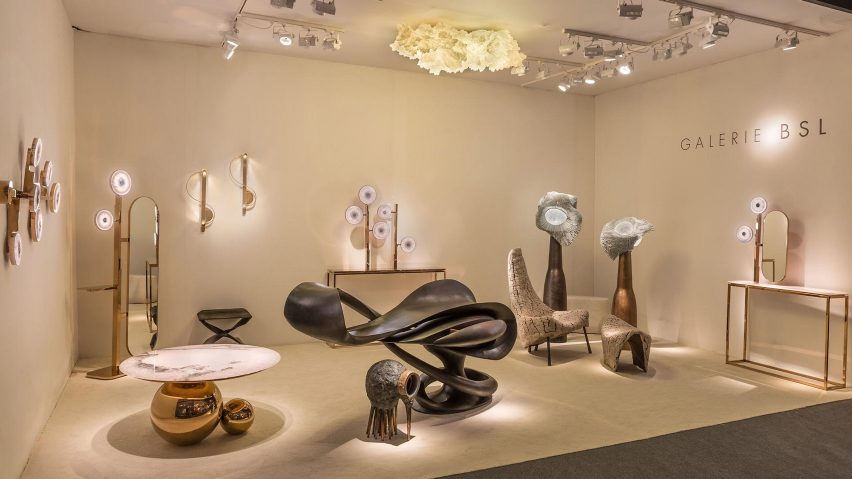
10 of the best collectible design pieces on show at PAD London
Design fair PAD is in London this week for its 11th edition. We've selected 10 stand-out pieces of limited-edition contemporary design from the show, including furniture covered in silk-worm cocoons and a chair that references ballet dancers.
Originally titled Pavillon des Antiquaires et des Galeries d'Art, PAD was established by art dealer Patrick Perrin in 1996. It was initially in Paris only, but has been running annually in London since 2006.
With a total of 68 galleries exhibiting modern, contemporary and historical design pieces, the fair has become one of the biggest events in the UK's collectible art and design calendar.
Contemporary design features heavily this year, with galleries including Carpenters Workshop Gallery and Gallery FUMI presenting newly commissioned pieces.
The fair, which runs alongside Freize Art Fair, is open until 8 October in London's Berkeley Square. Here is our pick of the contemporary pieces not to be missed:
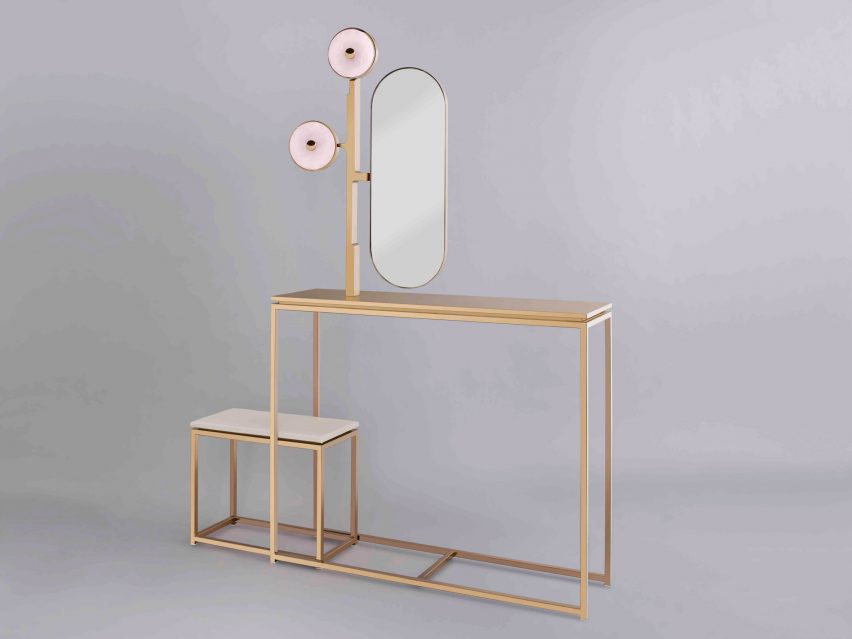
JinShi Pink Jade by Studio MVW
Galerie BSL, France
Pink jade console and coffee tables by Shanghai-based Studio MVW take centre stage at Galerie BSL's stand this year.
The pieces consist of pink jade elements mounted on brass-anodised stainless steel structures. Some incorporate lamps, which are illuminated by hidden LEDs and softened by the pink jade stone that sits in front of them.
Gallery director Laure-Hélène Joseph told Dezeen that the JinShi collection – which translates as "stone of gold" – reflects the cultural crossover between the two studio founders: Chinese designer Xu Ming and French partner Virginie Moriette.
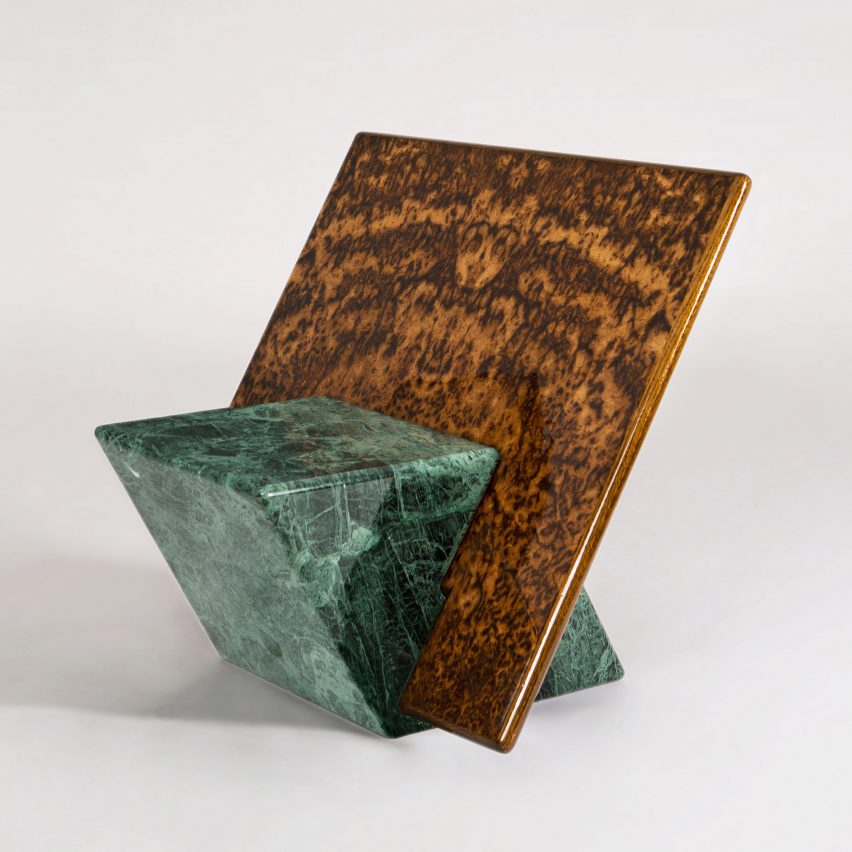
Fonteyn Chair by Brooksbank & Collins
Gallery FUMI, UK
This year, Gallery FUMI is presenting London-based Brooksbank & Collins' marble and oak veneer Fonteyn Chair, which was inspired by the "union" between ballet dancers Margot Fonteyn and Rudolf Nureyev.
"The ballet dancers epitomised the process of finding the perfect balance, and the designers reflected this in the chosen materials as well as the design itself," Gallery FUMI told Dezeen.
According to the studio, the two-part structure of the chair was intended to reflect the dynamic of the dance partnership: "The seat is resolutely athletic. It holds its back panel partner in a daring but perfect lift, the two bodies dancing in dynamic equilibrium."
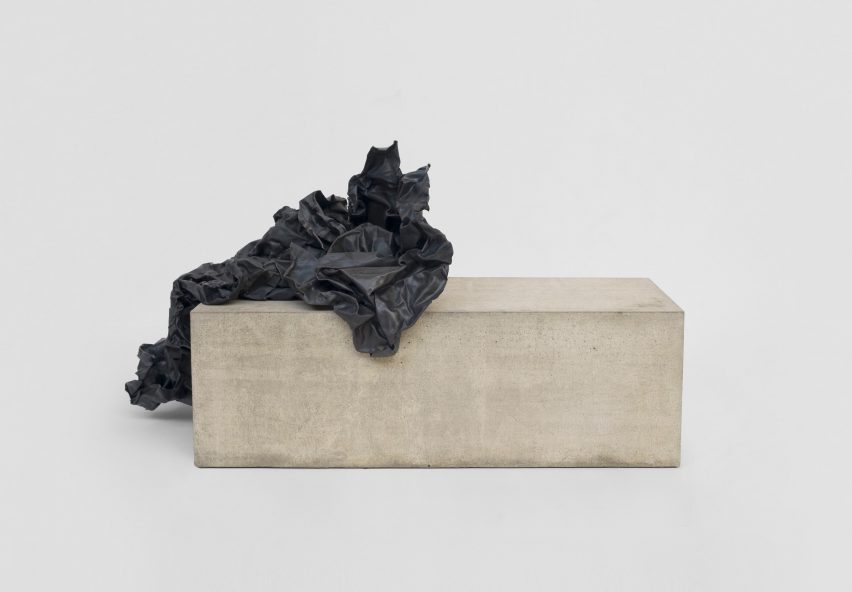
Study in Permanence bench by JamesPlumb
Gallery FUMI, UK
Gallery FUMI is also showing a concrete-based bench by London-based design studio JamesPlumb, which is part of its new Studies in Permanence collection. The lamps and benches feature sculpted pieces of black lead sitting atop dense masses of cubic concrete.
"The heaviest element, lead, in this state is extraordinarily malleable, almost vulnerable," said the studio. "It is then grounded by the absolute mass of concrete. Two materials of innate permanence separated and connected by their contrasting forms."
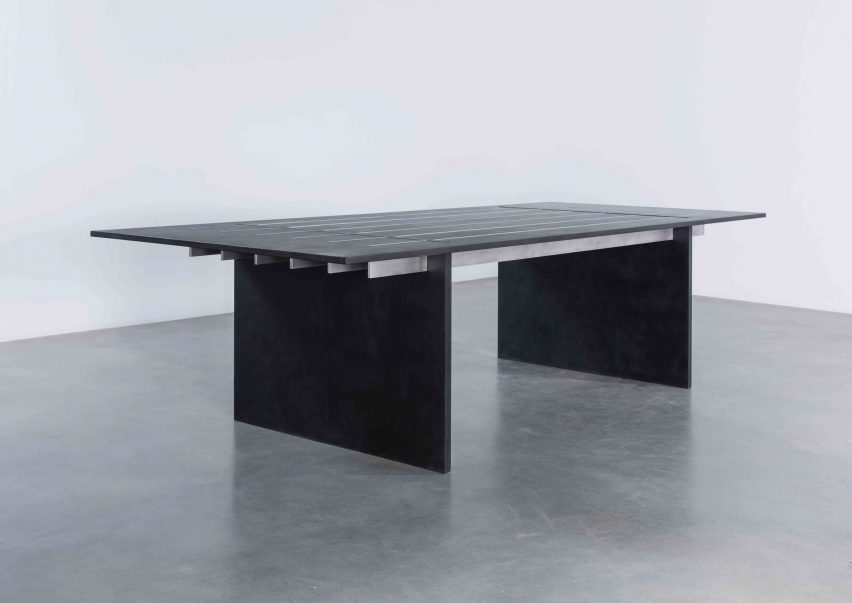
Plain Cuts table by Wonmin Park
Carpenters Workshop Gallery, UK, France and USA
Carpenters Workshop Gallery is showing a table by South Korean designer Wonmin Park made using patinated sheets of aluminium. The designer aimed for "simplicity, purity, and perfection", using a single, clean-cut sheet of aluminium for the tabletop and a further two sheets for the legs.
The structure also features six smaller cuts of metal inset into the surface that can be seen jutting through to the underside of the tabletop, creating the effect of an exposed construction, according to the designer.
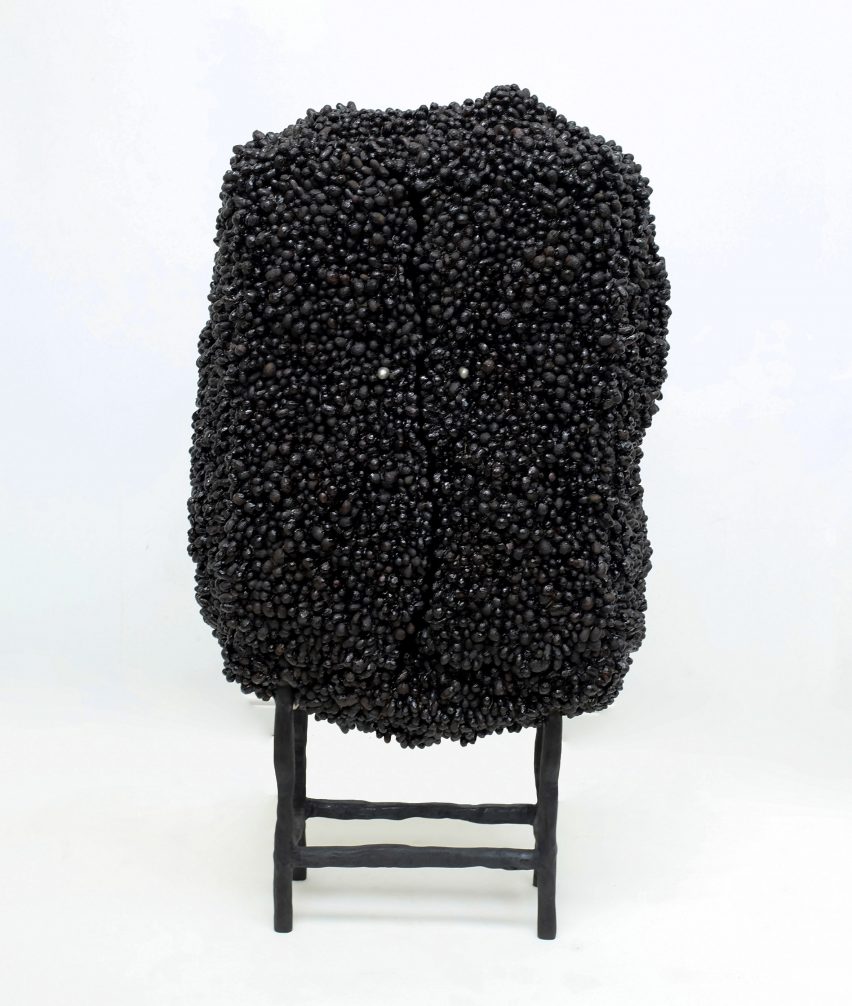
Cocoon Wardrobe by Marlène Huissoud
Sarah Myerscough Gallery, UK
Marlène Huissoud's wardrobe is part of her recent Cocoon collection, which explores sustainable materials produced by insects. She says it was inspired by her father, who was a beekeeper.
The main structure is oak, which has been scorched and then dyed before being covered with thousands of silk-worm cocoons, and then finally covered in a thin layer of varnish made from honey-bee bio resin.
"There's something quite uncanny and eerie about the pieces," Sarah Myerscough Gallery manager Julia Villard told Dezeen. "You can even still smell the honey-bee resin."
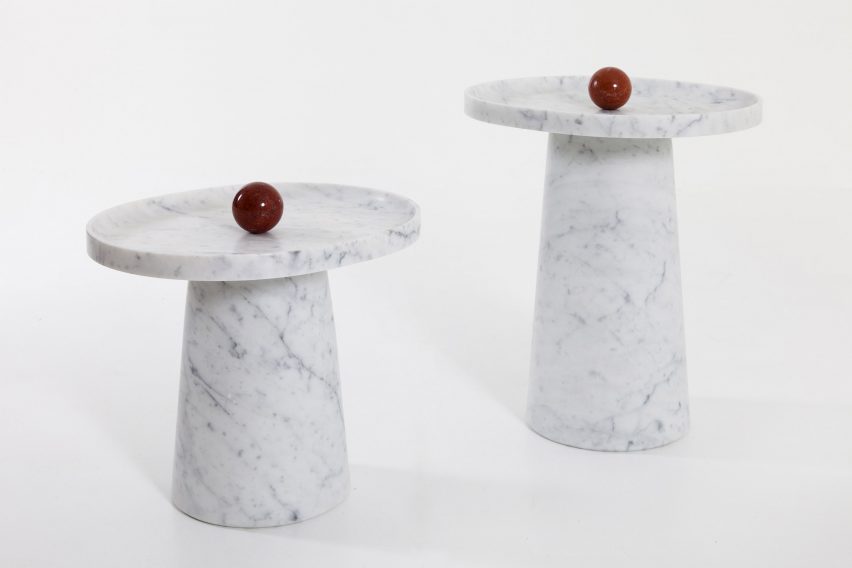
Marbles and Clowns side tables by Pierre Charpin
Galerie Kreo, UK and France
Galerie Kreo is showcasing white and red marble side tables by French designer Pierre Charpin, which are part of his 2015 Marbles and Clowns collection that centres around 10 porcelain vases, each named after a clown and hand-painted with a different face.
The side tables are informed by these vases – from above, two indents in the tables' surface form the clown's "eyes" and the third holds the spherical ball, as the clown's "nose".
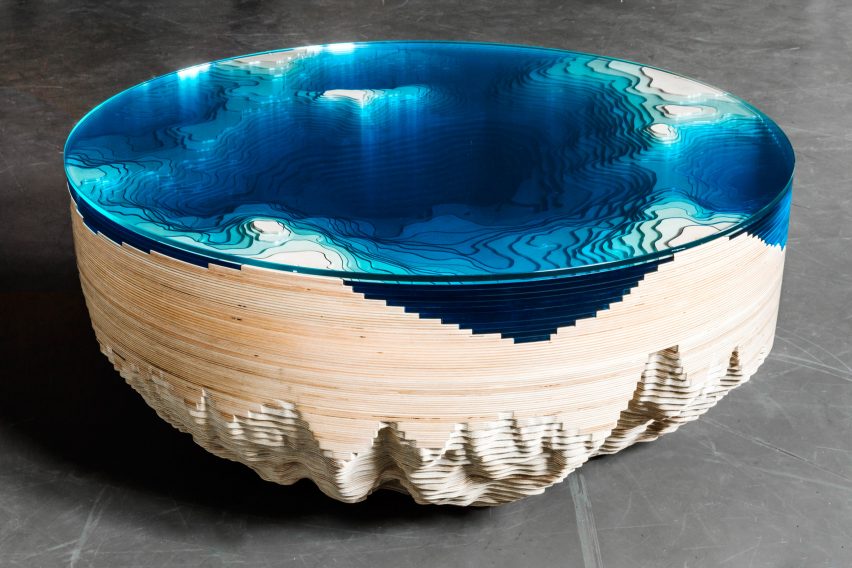
The Abyss Horizon table by Christopher Duffy
Sarah Myerscough Gallery, UK
London-based designer Christopher Duffy has used layers of sculpted plywood and coloured plexiglass to create a new circular version of his Abyss Horizon coffee table, which is being shown by Sarah Myerscough Gallery.
The stacked sheets of blue plexiglass create the impression of different depths and shades, taking its cues from the sea.
"I wanted to use this effect to replicate a real piece of the earth's seabed," said Duffy. "Like a mythical power had lifted a perfect circle straight from the earth's crust to use as his personal ornament."
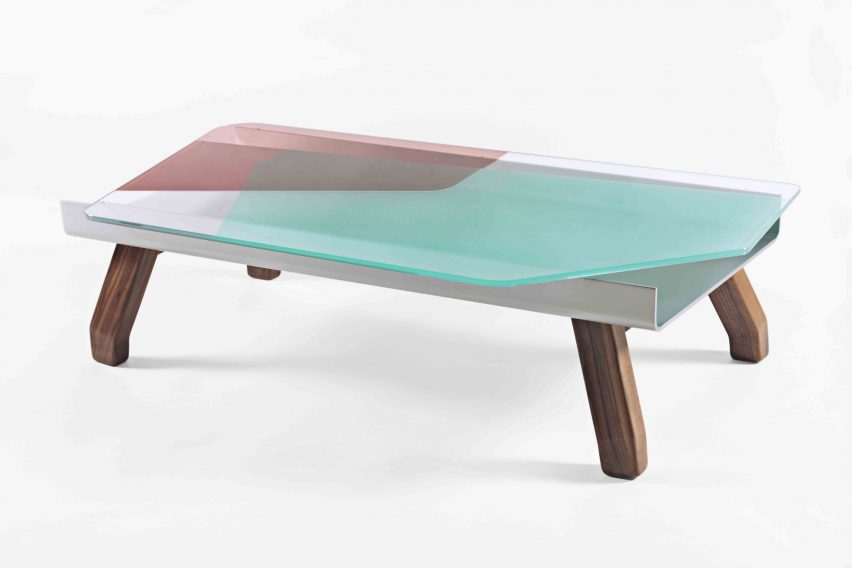
Dragonfly coffee table by Hella Jongerius
Galerie Kreo, UK and France
Like much of Dutch designer Hella Jongerius' other work, her Dragonfly coffee table explores the contrasts between different colours and materials.
The coffee table features a semi-transparent coloured glass top and a solid American walnut base. It is one of a collection of eight pieces, which come in an array of colours such as green, pink or orange.
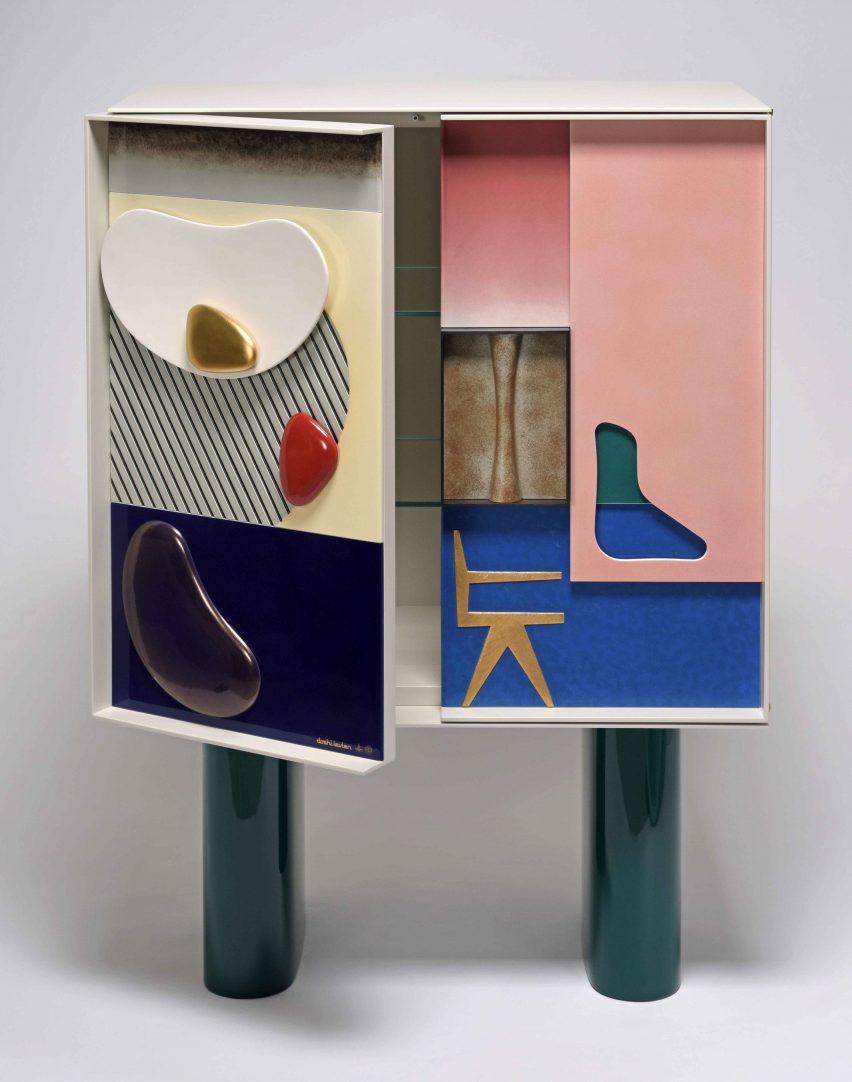
Chandigarh Cabinet by Doshi Levien
Sèvres, France
British duo Doshi Levien designed this cabinet using colours based on the palette of Swiss-French architect Le Corbusier.
Presented by Sèvres gallery, the cabinet is part of the Chandigarh collection, which pays homage to the Indian city planned and designed by Le Corbusier in the 1950s. The limited-edition cabinet is made from porcelain, porcelain biscuit and wood.
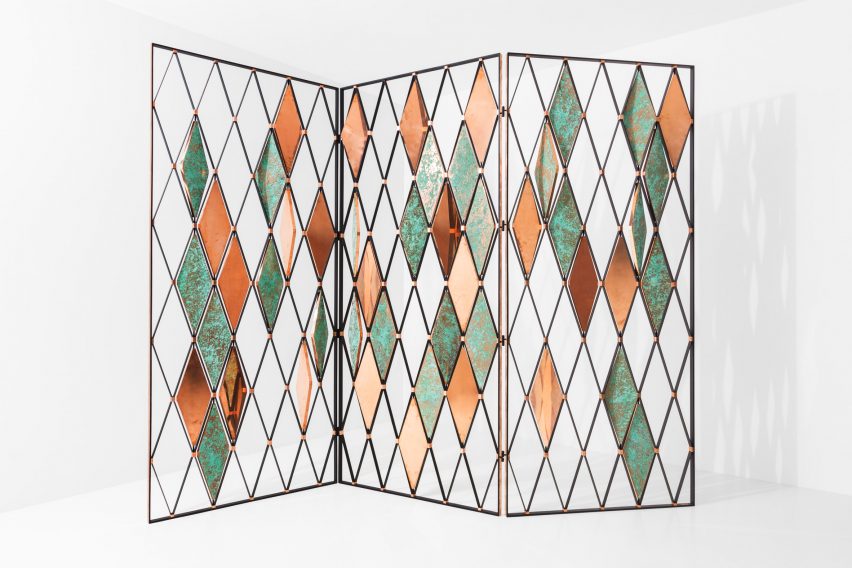
Paravento screen by Dimore Studio
Dimore Gallery, Italy
Milan-based Dimore Studio's Paravento screen has a matt black metal structure mounted with diamond-shaped elements. Each diamond can be pivoted to show either its verdigris copper or polished copper side.
The studio – which recently created rooms for hedonists inside London gallery Mazzoleni – describes the design as prioritising texture above anything else.